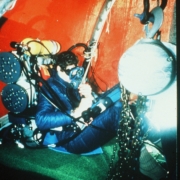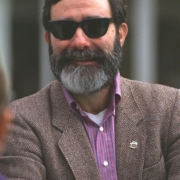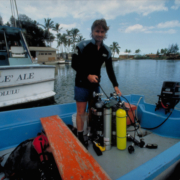




















TABLE OF CONTENTS



















In the space of a little more than a decade, sport diving along with the scientific community, transitioned from “air diving”—a single gas to handle all exposures—to mixed gas diving, which was developed by military and commercial divers to improve diving safety and performance. In doing so, we collectively pushed our diving envelope from “no-stop” exposures with maximum depths of 130 f/40 m to full-on decompression dives to depths of 250-300 f/76-100m and beyond. In the words of tech diving pioneer, Capt. Billy Deans, “We doubled our underwater playground.”
There was also tremendous interest in rebreather technology, which at the time was essentially the sole province of military divers. It would take nearly another decade for rebreathers to become a common tool for exploration, and extend our envelope even further.
The story of technical diving is the story of passionate explorers, adventurers, inventors and engineers, educators and scientists who were driven by the need to “go deeper and stay longer”—a common theme that runs through the history of diving—to accomplish their goals, whether that was seeing the end of the cave, exploring a virgin shipwreck or discovering new fish species on a deep coral reef. These were the people that invented technical diving, and the stories of their challenges, triumphs and tragedies filled the pages of aquaCORPS.
Each issue of aquaCORPS featured a Q&A interview that I conducted with one or more remarkable individuals who helped push our collective envelope in exploration, science, technology, education, or photography and filmmaking. Of the 18 individuals who’s interviews are shown above, 14 are still with us today, as this content is being prepared for posting.
The interviews, which were conducted from 1989-1999, have been digitally re-mastered and are presented here thanks to Technical Diving International (TDI), for your reading enjoyment and information. Please note that these are only a small subset of the pioneers who helped create technical diving. Many of these were regular contributors to aquaCORPS, and presenters in the original tek.Conferences and Rebreather Forums 1.0 & 2.0, which I produced.
In addition, I have included the interview that Phil Nuytten, founder & CEO of Nuytco Research and publisher of DIVER magazine conducted with me titled “aquaCORPS: The Autopsy,” that ran in the June, 2005 issue of DIVER. Also included is the original “teaser” written by me, which appeared in the prior April issue. In the interview we discussed the backstory of aquaCORPS and how the magazine came to be. — Michael Menduno

This site uses cookies. By continuing to browse the site, you are agreeing to our use of cookies.
Accept settingsHide notification onlySettingsWhen you visit any website, it may store or retrieve information mostly in the form of cookies. This information might be about you, your preferences or your device and is mostly used to make the site work as you expect it to. The information stored in a cookie does not usually directly identify you, but it can give you a more personalized web experience.
Because we respect your right to privacy, you can choose not to allow cookies.
When you visit this Website, you can browse the Website and access information without revealing your identity. We do use cookies to store essential information which is necessary for the Website to function and cannot be switched off in our systems. A cookie is a small amount of data that is transferred to your browser by our web server and can only be read by the server that gave it to you. Most browsers are initially set to accept cookies. You can set your browser to notify you when you receive a cookie, giving you the chance to decide whether to accept it or not. If you choose not to accept cookies, you will encounter issues with the Website and the Website will continue to prompt you to accept/refuse cookies when revisiting the Website site. We fully respect it if you want to refuse cookies, and you are free to opt out or in at any time. If you refuse cookies, we will remove all the cookies associated with our Website.
As a reminder, your choice will only apply to the browser and device you are currently using to visit our Website. It will not apply to a different browser or device. If you visit our website using a different browser or device, you will need to exercise your choice for each browser or device again.
Essential Website cookies are strictly necessary to provide you with services available through our website and to use some of its features. Because these cookies are strictly necessary to deliver the Website, refusing them will have impact on how our site functions. Some of these cookies allow us to count visits and traffic sources so we can measure and improve the performance of our site. All information these cookies collect is aggregated and therefore anonymous.
You can read about our cookies and privacy settings in detail on our Privacy Policy Page.
Privacy PolicyYour session is about to expire. Would you like to extend the session or logout?
This site uses cookies. By continuing to browse the site, you are agreeing to our use of cookies.
Accept settingsHide notification onlySettingsWhen you visit any website, it may store or retrieve information mostly in the form of cookies. This information might be about you, your preferences or your device and is mostly used to make the site work as you expect it to. The information stored in a cookie does not usually directly identify you, but it can give you a more personalized web experience.
Because we respect your right to privacy, you can choose not to allow cookies.
When you visit this Website, you can browse the Website and access information without revealing your identity. We do use cookies to store essential information which is necessary for the Website to function and cannot be switched off in our systems. A cookie is a small amount of data that is transferred to your browser by our web server and can only be read by the server that gave it to you. Most browsers are initially set to accept cookies. You can set your browser to notify you when you receive a cookie, giving you the chance to decide whether to accept it or not. If you choose not to accept cookies, you will encounter issues with the Website and the Website will continue to prompt you to accept/refuse cookies when revisiting the Website site. We fully respect it if you want to refuse cookies, and you are free to opt out or in at any time. If you refuse cookies, we will remove all the cookies associated with our Website.
As a reminder, your choice will only apply to the browser and device you are currently using to visit our Website. It will not apply to a different browser or device. If you visit our website using a different browser or device, you will need to exercise your choice for each browser or device again.
Essential Website cookies are strictly necessary to provide you with services available through our website and to use some of its features. Because these cookies are strictly necessary to deliver the Website, refusing them will have impact on how our site functions. Some of these cookies allow us to count visits and traffic sources so we can measure and improve the performance of our site. All information these cookies collect is aggregated and therefore anonymous.
You can read about our cookies and privacy settings in detail on our Privacy Policy Page.
Privacy Policy